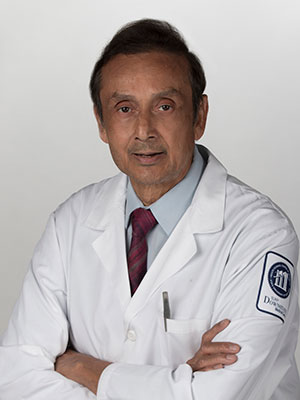
Satyakam Bhagavati, MBBS, MD
Professor Emeritus
Department of Neurology
Dr Bhagavati is a clinical neurologist with a broad interest in the molecular basis of various neurological disorders, especially neuromuscular and autoimmune disorders of the nervous system. His research was among the very first to show, in findings published in the New England Journal of Medicine, the causal linkage of the retrovirus HTLV-1 with tropical spastic paraparesis, a condition now recognized worldwide as HTLV-1 associated myelopathy. Subsequently, Dr Bhagavati was funded by the NIH as Principal Investigator for over a decade. His work has involved elucidating the molecular basis of neuromuscular disorders like myotonic dystrophy and investigating novel methods for treating such disorders by regenerating normal muscle in animal models of muscular dystrophies.
Dr Bhagavati earned his medical degree and then completed post-graduate training in Medicine from the All India Institute of Medical Sciences, New Delhi; Neurology resident, Chief resident and Fellowship training in Neuromuscular Disorders/EMG at SUNY Downstate Health Sciences University, New York and molecular biology training and research as Expert/Fellow at the NCI, National Institutes of Health, Bethesda.
Dr Bhagavati also has a special interest in investigating the quality, integrity and reproducibility of published research and in measures to improve the reliability of scientific findings. His publications have identified and detailed conceptual and methodological weaknesses in widely promulgated gene therapies for Duchenne muscular dystrophy and spinal muscular atrophy and therapies for other neurovascular disorders and suggested ways to better confirm efficacy.
Dr Bhagavati is an avid clinician and student/teacher with an abiding interest in all facets of clinical Neurology and translational research..
Education
- Undergraduate: All India Institute of Medical Sciences, New Delhi, India
- Medical School: All India Institute of Medical Sciences, New Delhi, India
- Internship: All India Institute of Medical Sciences, New Delhi, India
- Residency: SUNY Downstate Health Sciences University
- Fellowship: SUNY Downstate Health Sciences University and National Institutes of Health, Bethesda , MD
Research Interests
- Neuroimmunology
- Neuromuscular Disorders
- Bhagavati S. Autoimmune Disorders of the Nervous System: Pathophysiology, Clinical Features and Therapy. Frontiers of Neurology. 2021 April 14; doi: 10.3389/fneur.2021.664664.
- Bhagavati S. Diagnostic accuracy of blood-based biomarker panels: A systematic review. Frontiers in Aging Neuroscience. 2022 Apr 29;14:895398. doi: 10.3389/fnagi.2022.895398.
- Bhagavati S. Intravenous thrombolysis for ischemic strokes: a call for reappraisal. Brain 2015 Apr; 138( pt4): e341, 1-5.
- Bhagavati S. Questions about efficacy of exon-skipping therapy for Duchenne Muscular Dystrophy. Annals of Neurology 2014, 75(2) 326-329.
- Bhagavati S, W.Xu. Generation of skeletal muscle from transplanted embryonic stem cells in dystrophic mice. Biochem Biophys Res Commun 2005 Jul 29; 333(2): 644-649.
- Bhagavati S. Paraneoplastic sensory ganglionopathy. New England Journal of Med 2021 Jan 14;384(2):192. doi: 10.1056/NEJMc2033783.
- Bhagavati S. Doubts about therapy for neurological diseases with antisense oligonucleotides. JAMA Neurology 2016 Dec 1; 73(12): 1502.
- Bhagavati S. Exon skipping therapy for Duchenne muscular dystrophy. Lancet 2012, Jan 14; 379 (9811); e10.
- Bhagavati S, Ghatpande A, Leung B. Identification of two nuclear proteins which bind to RNA CUG repeats: significance for myotonic dystrophy. Biochem Biophys Res Commun. 1996 Nov 1;228(1):55-62. doi: 10.1006/bbrc.1996.1615.
- Bhagavati S, et al. Detection of human T-cell lymphoma/leukemia virus type I DNA and antigen in spinal fluid and blood of patients with chronic progressive myelopathy. New Eng J of Med. 1988 May 5;318(18):1141-7. doi: 10.1056/NEJM198805053181801.